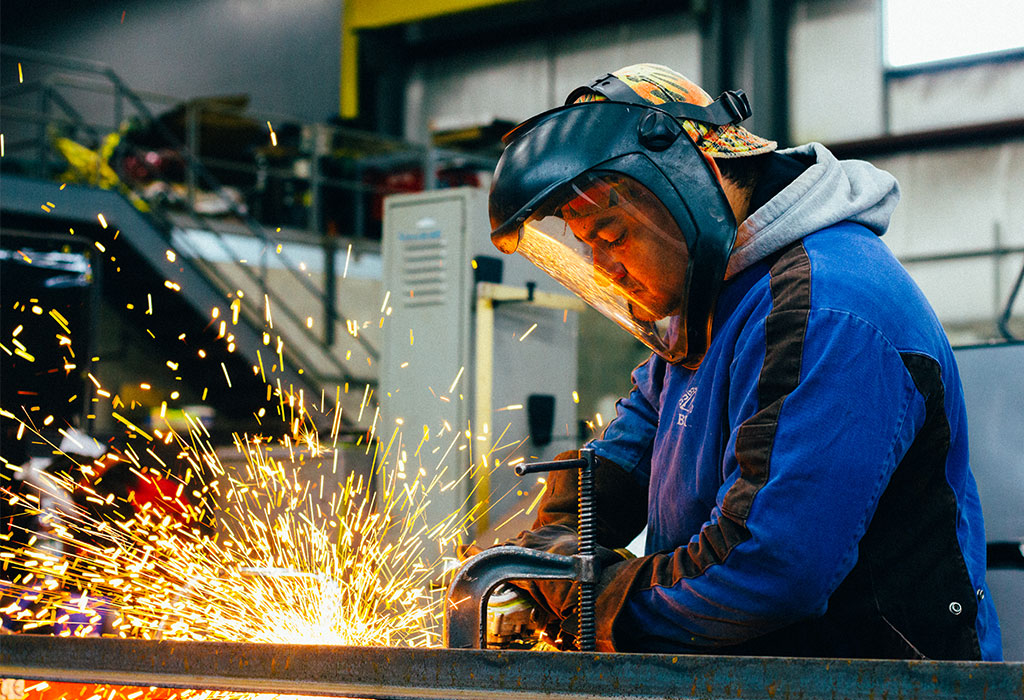The Ultimate Handbook on Personalized Steel Fabrication Solutions for Structural Projects
In the world of structural jobs, the significance of personalized steel fabrication solutions can not be overemphasized. From the foundational understanding of steel manufacture fundamentals to the elaborate process of selecting the most appropriate materials, every step in this journey plays an essential role in the supreme success of a project.
Comprehending Personalized Steel Manufacture Fundamentals
Digging right into the fundamentals of personalized steel fabrication supplies insight into the intricate procedure of transforming raw steel into tailored architectural components. Custom-made steel fabrication is a customized production technique that includes cutting, shaping, and assembling steel products to create distinct frameworks according to certain project requirements. Recognizing the basics of customized steel manufacture is essential for ensuring the successful execution of architectural jobs.
The procedure normally starts with the assessment of project requirements and style needs. This initial stage involves detailed planning and collaboration between engineers, developers, and fabricators to establish the most suitable approach for fabricating the steel elements. Accuracy is crucial during the fabrication procedure, as even minor discrepancies can influence the structural honesty of the end product.
Various methods, such as reducing, welding, and shaping, are used to transform raw steel into the desired architectural components. Experienced makers make use of sophisticated equipment and devices to ensure precision and consistency throughout the fabrication procedure. Quality control steps are implemented to verify the integrity of the produced components before they are set up on-site, making certain conformity with market criteria and job requirements.
Picking the Right Steel Products

First and primary, the kind of architectural project and its details requirements play an essential function in establishing one of the most appropriate steel materials. Aspects such as the load-bearing capacity, environmental conditions, and preferred life expectancy of the structure will certainly dictate the grade and type of steel that need to be utilized.
Moreover, the physical properties of the steel, including ductility, weldability, and strength, must line up with the task's demands to ensure optimal efficiency and durability (Alpha reo). Furthermore, considerations such as corrosion resistance, cost-effectiveness, and schedule of the steel materials ought to likewise be thought about throughout the choice procedure
Style Considerations for Structural Projects
Architectural jobs demand meticulous interest to make considerations to make certain both capability and safety are focused on throughout the construction process. When it comes to developing architectural jobs, a number of vital elements have to be taken into account to guarantee the success of the undertaking. By thoroughly taking into consideration these aspects during the design stage, engineers and engineers can ensure the structural job's success from perception to completion.
Improving Fabrication Processes for Effectiveness

Furthermore, implementing lean manufacturing concepts can substantially improve efficiency in steel fabrication. By decreasing waste, enhancing workflow, and enhancing interaction between various groups associated with the manufacture process, jobs can be completed a lot more swiftly and with greater quality standards.
Moreover, developing an efficient production routine and process can help in focusing on tasks, assigning sources efficiently, and meeting job target dates immediately. By having a clear strategy in area and routinely monitoring progression, any kind of prospective bottlenecks or hold-ups can be recognized and addressed without delay, making sure smooth and effective fabrication procedures for structural tasks.
Quality Assurance and Job Monitoring in Steel Fabrication
To make certain my review here the effective execution of steel manufacture jobs, precise quality assurance steps and reliable job management practices are crucial parts in preserving accuracy and conference customer expectations. Quality assurance in steel fabrication entails extensive evaluations investigate this site at various phases of the manufacture procedure to verify conformity with project specifications and market requirements. This consists of product screening, dimensional checks, and weld evaluations to make certain structural integrity and safety.
Task monitoring plays a vital duty in coordinating the different aspects of steel manufacture jobs, such as organizing, resource allocation, and interaction among employee. A well-defined job strategy with clear purposes, turning points, and timelines helps to keep an eye on progression and address any type of prospective issues proactively. Effective communication between all stakeholders, consisting of clients, professionals, designers, and producers, is important for ensuring that the project advances smoothly and satisfies the desired high quality criteria.
Final Thought
Finally, custom steel manufacture plays an essential role in architectural tasks by offering customized remedies using the ideal products and layout considerations. Effectiveness in construction procedures, quality assurance, and effective project administration are necessary for successful end results. By comprehending the essentials of custom-made steel manufacture and applying structured processes, task groups can provide durable and moved here top notch structures that fulfill the particular demands of their clients.
Personalized steel manufacture is a specific manufacturing method that includes cutting, shaping, and setting up steel materials to create one-of-a-kind structures according to specific project demands.To make sure the successful execution of steel manufacture jobs, careful quality control procedures and reliable task administration practices are important elements in keeping accuracy and conference client expectations. Quality control in steel manufacture involves rigorous examinations at different phases of the construction process to validate conformity with job specs and industry standards (metal fabrication melbourne).Job monitoring plays an essential duty in coordinating the different aspects of steel fabrication tasks, such as scheduling, source allocation, and communication amongst group participants.In conclusion, customized steel manufacture plays an important function in structural jobs by giving customized services making use of the ideal products and layout considerations